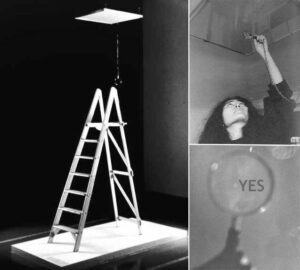Jean Rhys and Yoko Ono: The Feminine ‘Yes’ and the Masculine (oh) ‘No’

‘Death often is the point of life’s joke’— Vladimir Nabokov, Laughter in the Dark
Given that Good Morning, Midnight is a modernist text which collapses temporal linearity through a series of dream sequences, flashbacks and drunken hazes, it seems appropriate to begin at the end by using the novel’s closing words of ‘yes-yes-yes…’ (157) as a way into the text. Not only do these words allow Rhys’ novel to reach across into the narrative space of Joyce’s modernism, but they also, I think, function as a means of understanding central themes of desire, power and sanity, particularly when we look at how the words ‘yes’ and ‘no’ work throughout the text in a deliberately patterned and gendered way.
The words yes and no appear in the novel’s opening phrase: ‘”Quite like old times,”the room says. “Yes? No?”‘ (3) Is this the room actually speaking to us, is it rhetorically spoken by Sasha’s mind as a form of psychological projection or is it asking us as readers to make a verdict? This double framing of space as both past and present, ‘yes’ and ‘no’, means that the reader’s perception of time, space and Sasha’s subjectivity is framed by contradiction from the offset. I also read her despairing cry, ‘I have no name, no face, no country. I don’t belong anywhere.’ (32) in line with Orlando Patterson’s postcolonial theory of the social death which is appropriate given Sasha’s status as a marginal migrant figure but also a marginal woman who is socially invisible or dead within a man’s ‘place’, ‘space’ and ‘country’. Ellison’s Invisible Man comes to mind – it is interesting how both subvert traditions of literary form, so that critics cannot fix them in canonical or stylistic place, but that’s a blog for another day. Angered by Sasha’s ‘too passive’ (Rhys 72) approach to sex, I suggest that it is also significant that Enno is an anagram for the word ‘none’ so that the words ‘no’ and ‘none’ become inherently associated with masculinity and its denying or negating of female existence and desire. Honestly, I felt sorry for my boyfriend after reading this novel as I passionately explained to him that it made me want to avoid men like the plague and quit drinking… this was whilst I ate dinner in his company and drank a significant volume of his wine. Ah yes, I, like Rhys, seem to love irony…
‘Yes’ on the other hand is rendered as a feminine word throughout the text. Take the moment when Sasha is propositioned for sex: ‘Can you resist? Yes, I can… “Stupid, stupid girl”, he said doing up his buttons’ (136). Rather than it being framed as ‘Do you want this’ to which the answer would be the masculine ‘no’, it is framed as to give the word ‘yes’ the feminine force of resistance against patriarchal assumptions about her desires. This notion of agency is later echoed in how Sasha renders space and place when she declares: ‘Yes, it can be sad, the sun in the afternoon’ (42). The world is rendered in line with her interior state; ‘yes’, the sun is what she says it is, and it is sad because she is and who could blame her? So, how are we to read Rhys’ ‘yes-yes-yes’ against Molly Bloom’s: ‘and his heart was going like mad and yes I said yes I will Yes’ (Joyce 921)? Do we read the implied sexual intimacy as happening purely on Sasha’s terms, and as transcendence or convalescence from her suffering, alienation and oppression? Or do we read ‘yes’ in the Joycean sense as the female word of “acquiescence, self-abandon, relaxation, the end of all resistance” (Kenner 147). Emery for example reads the embrace of the ghost-like commis as a ‘welcome to death’ (144) whilst Castro views the final scene as Sasha’s willing acceptance of her tormentor following the loss of Rene, a man she could have loved (21). I suggest both are too simplistic for a novel so complex.
Firstly, I think to understand the end we must go back to the description of the ‘two beds, a big one for madame and a smaller one.. for monsieur’ (Rhys 3). Considering that the darkest, most chilling episode of the novel happens on ‘the wrong bed’ (Rhys, 141), the bed of ‘monsieur’, it seems significant that the yes-yes-yes is uttered on the bed of the feminine, as to correlate the words with female self-actualisation. This is a reading that can be enhanced or fleshed out in reference to Freud’s Mourning and Melancholia, as there is a sense throughout the novel that Sasha’s sense of loss, of her past, her son and her father, means that she suffers ‘an impoverishment of [her] ego on a grand scale’ (Freud 246) so that any resolution in the novel would not be the revival of the ‘lost object’ (247), but the lost self. Given that the ghost-like commis wears a ‘white robe’ (Rhys, 144) similar to that of Sasha’s father who is depicted wearing a ‘long white shirt’ (13) in an early dream scene, I suggest that the final scene could be viewed as a symbolic embracing of her past and her father in the present moment. In this sense ‘yes-yes-yes’ marks a point of catharsis in which Sasha paradoxically finds self actuality in self-giving and the light of mo[u]rning in the darkest moment of the novel, the midnight blackness of her near rape. The fact the yes-yes-yes implies desire, intimacy and sensuality thus recalls Lacan’s summary of suggesting that it is ‘one’s own ego that one loves in love, one’s own ego made real on the imaginary level’ (1991, 142). In this sense the final scene could be read as an embrace or a making real of an ego that Sasha spends the whole novel denying, obliterating and drowning out.
Despite this arguably ‘depressing’ outlook, I do think the trajectory of the novel can be usefully compared to Yoko Ono’s ladder in that we, as readers, climb up towards the final declaration of ‘yes’, though perhaps the steps break along the way to create what Joubert labels as the sense of “immobile movement” (241) in Rhys’ fiction. Whilst circularity and stagnation do create a formal replication of Sasha’s mental struggle, I do suggest that the ‘yes-yes-yes’, with all its ambivalence has a force of affirmation not dissimilar to Woolf’s closing line: ‘It was Clarissa. There she was’ (132) and Ono’s tiny little ‘YES‘ on the ceiling. Even if Sasha’s ‘yes-yes-yes’ is read as an embrace of death, or an acquiescence, or as actual climaxing with a repulsive little man (lets be real, unlikely), it is at least all on her own terms. The steps break but the ladder is climbed eventually, so to speak. Rhys’ acerbic humour, and her dazzling capacity to translate vulnerability into words offers a nuanced critique of an omnivorous, patriarchal society that still, I argue, loves to exploit and alienate those who are ‘slow in the uptake, uncertain [and] slightly damaged in the fray’ (Rhys, 32). And so just as I began at the end, I end at the start: I suggest that Good Morning, Midnight can be usefully read as a sister narrative of Nabokov’s Laughter in the Dark, which is an equally brilliant, devastating and darkly humorous attack on the mad world that we live in and the absurd humans that we can be.

‘It’s a great relief when you get up the ladder and you look through the spyglass and it doesn’t say ‘no’ or ‘fuck you’ or something. It says ‘yes.’” Ono described ‘Ceiling Painting’ (1966) as being about the discovery of hope following a severe depressive episode. I suggest that in a novel of masculine ‘no’s’, the holy trinity of ‘yeses’ is a feminine and spiritual triumph, albeit a twisted and problematic one, that requires a cynical lens (or spyglass) to understand it as an affirmative.
________________________________________________________
Naturally the theme tune for this simultaneously depressingly and humorous novel would have to be Tears for Fears’ Mad World:
And I find it kind of funny
I find it kind of sad
The dreams in which I’m dying
Are the best I’ve ever had
https://www.youtube.com/watch?v=SFsHSHE-iJQ
Bibliography
Castro, Joy. “Jean Rhys.” The Review of Contemporary Fiction 20.2 (2000): 8-25.
Emery, Mary Lou. (1990) Jean Rhys at “World’s End”. Austin : University of Texas Press.
Freud, Sigmund (1916). Mourning and Melancholia. London: Hogarth Press.
Lacan, Jacques. (1991) Freud’s Papers on Technique 1953-1954. The Seminar of Jacques Lacan, Book 1. Trans. John Forrester. Ed. Jacques-Alain Miller. New York: Norton.
Joubert, Claire. (1997) Lire le féminin. Paris: Messene.
Joyce, James (2012). Ulysses.
Kenner, Hugh (1987). Ulysses. Johns Hopkins University Press.
Nabakov, Vladimir (2009). Laughter in the Dark. London: Penguin.
Rhys, Jean (2011). Good Morning, Midnight. London: Penguin.
***desire, lack and the loneliness of grief -may be worth prodding into.




Recent comments